Puzzles offer a powerful way to alleviate anxiety, providing a calming focus that can greatly reduce stress levels. Whether you prefer jigsaw puzzles, brain teasers, crosswords, Sudoku, or tangrams, each type offers unique benefits for mental well-being. They engage your mind, redirecting thoughts away from worry and promoting mindfulness. As you solve puzzles, you'll boost your confidence, improve cognitive skills, and create a sense of accomplishment. To maximize these benefits, consider setting up a dedicated puzzle space with proper lighting and comfortable seating. By incorporating puzzles into your routine, you'll discover a peaceful hobby that soothes your mind and eases tension. Explore further to uncover the full potential of puzzle-solving for anxiety relief.
Understanding Anxiety and Puzzle Benefits
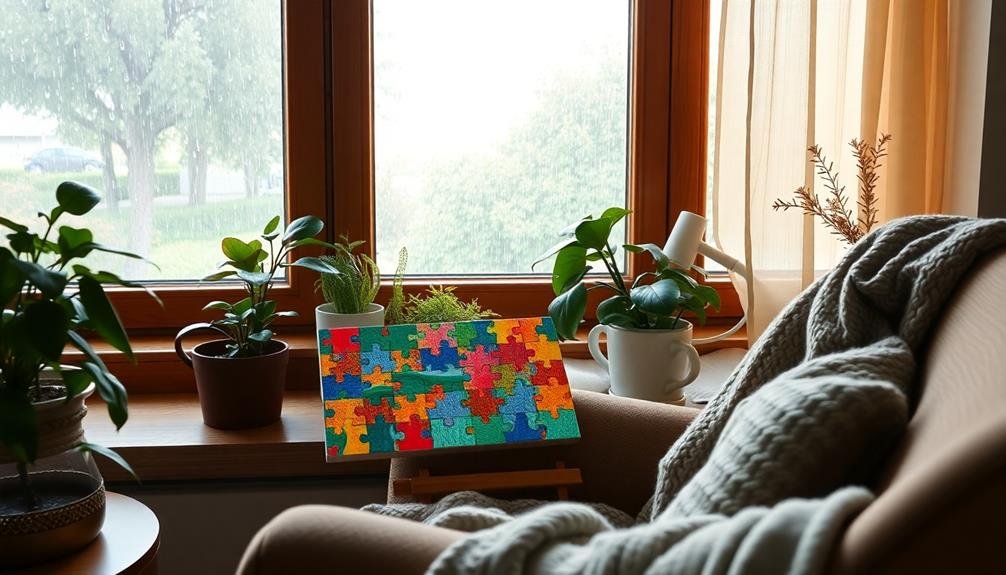
Anxiety sufferers often seek relief through various activities, and puzzle-solving has emerged as a powerful anxiety-busting hobby. When you're struggling with anxiety, your mind can feel overwhelmed and scattered. Puzzles offer a structured, focused activity that can help redirect your thoughts and ease tension.
Understanding how puzzles benefit your anxious mind is key to harnessing their therapeutic potential. They provide a clear goal and a sense of accomplishment, which can boost your confidence and mood. As you concentrate on fitting pieces together or solving a crossword, you're engaging in a form of mindfulness that pulls you away from anxious thoughts.
Different types of puzzles target various cognitive skills. Jigsaw puzzles enhance spatial reasoning and patience, while word puzzles strengthen language skills and memory. Sudoku and logic puzzles sharpen problem-solving abilities.
These mental exercises can improve your overall cognitive function, potentially making you more resilient to stress in daily life.
Jigsaw Puzzles for Mental Peace
Among the various puzzle types, jigsaw puzzles stand out as particularly effective for promoting mental peace. When you engage with a jigsaw puzzle, you're entering a world of focused concentration that can greatly reduce anxiety. The act of sorting and fitting pieces together demands your full attention, effectively pushing worries to the background.
As you work on a jigsaw puzzle, you'll find yourself in a state of flow, where time seems to slow down and external stressors fade away. This meditative-like experience can lower your heart rate and blood pressure, contributing to an overall sense of calm. You'll also enjoy a boost in dopamine levels each time you successfully place a piece, reinforcing positive feelings.
Jigsaw puzzles offer a tangible sense of progress and accomplishment. As the image gradually comes together, you'll feel a growing sense of satisfaction and control. This can be especially beneficial if you're dealing with anxiety-inducing situations that seem overwhelming or unmanageable.
Brain Teasers to Calm Nerves

Three types of brain teasers can effectively calm your nerves: logic puzzles, word games, and number riddles. These mental exercises engage your mind, redirecting your focus from anxiety-inducing thoughts to problem-solving activities.
Logic puzzles, like Sudoku or lateral thinking problems, require you to analyze information and draw conclusions. They'll help you develop critical thinking skills while providing a sense of accomplishment. Word games, such as crosswords or anagrams, improve your vocabulary and language skills, offering a linguistic challenge that can be both fun and rewarding.
Number riddles, including math puzzles or sequences, sharpen your numerical reasoning and pattern recognition abilities. These brain teasers can be particularly effective in calming nerves, as they demand concentration and systematic thinking.
Here's a quick guide to help you get started:
| Brain Teaser Type | Examples | Benefits | Difficulty Level |
|---|---|---|---|
| Logic Puzzles | Sudoku, Rubik's Cube | Improves reasoning | Medium to High |
| Word Games | Crosswords, Scrabble | Enhances language skills | Low to Medium |
| Number Riddles | Math puzzles, Sequences | Boosts numerical thinking | Medium |
| Mixed Puzzles | Escape rooms, Riddles | Combines multiple skills | Varies |
Crosswords and Word Searches
Countless word enthusiasts turn to crosswords and word searches as effective anxiety-relieving hobbies. These puzzles offer a perfect blend of challenge and relaxation, allowing you to focus your mind on a specific task while gently easing stress. As you scan for hidden words or fill in blanks, you're engaging in a mindful activity that can help quiet anxious thoughts.
Crosswords, in particular, stimulate your brain's problem-solving abilities. They require you to think creatively, draw on your vocabulary, and make connections between clues and answers. This mental workout can be incredibly satisfying, providing a sense of accomplishment with each completed puzzle.
Word searches, on the other hand, offer a more meditative experience. The repetitive motion of scanning for words can be soothing, and the satisfaction of finding each hidden term can boost your mood. They're also great for improving your concentration and visual perception skills.
Both puzzles are easily accessible, whether in newspapers, puzzle books, or on your smartphone. You can tackle them during your commute, lunch break, or before bed, making them convenient tools for managing anxiety throughout your day.
Sudoku and Number Games
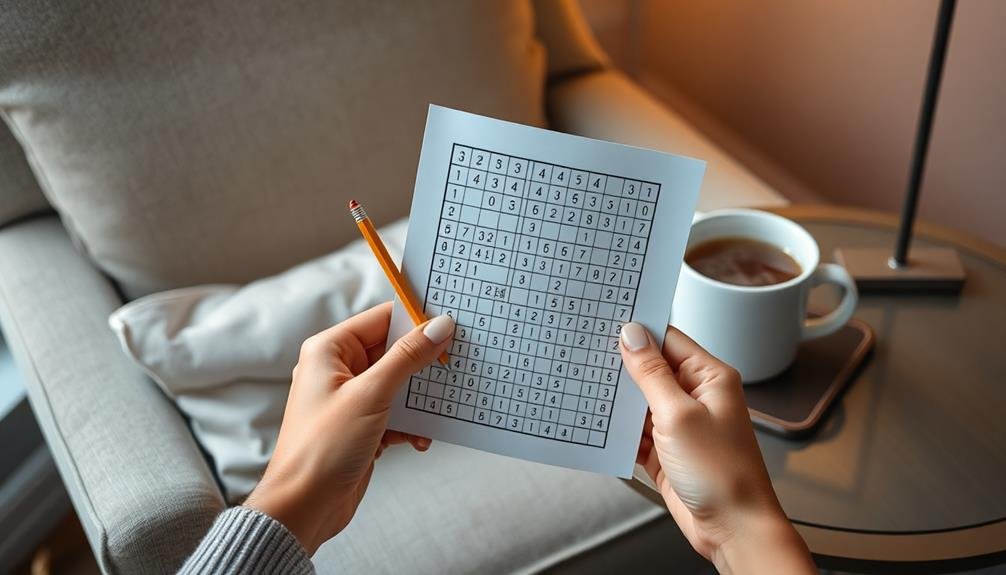
For those who find solace in numbers, Sudoku and other number games offer a compelling way to relieve anxiety. These puzzles engage your logical thinking and problem-solving skills, effectively distracting your mind from worrisome thoughts.
Sudoku, with its grid-based format and number placement challenges, can be particularly soothing as you focus on finding the correct sequence. You'll find that as you progress through different difficulty levels, your confidence grows, providing a sense of accomplishment. This boost in self-esteem can be invaluable when dealing with anxiety.
Other number games like KenKen, Kakuro, or even simple math puzzles can offer similar benefits. Don't worry if you're not a math whiz; these games are more about patterns and logic than complex calculations. Start with easier puzzles and work your way up.
You'll likely notice improvements in your concentration and memory as you practice regularly. To incorporate number games into your anxiety-relief routine, set aside dedicated puzzle time each day.
Whether it's during your morning coffee or before bed, consistent engagement can help create a calming ritual. You can find these puzzles in books, newspapers, or smartphone apps, making them easily accessible whenever you need a mental break.
Tangrams and Spatial Puzzles
Tangrams and spatial puzzles offer unique benefits for your mental health, helping to reduce anxiety by focusing your mind on shape manipulation and problem-solving.
You'll find these puzzles enhance spatial awareness, improve cognitive flexibility, and provide a meditative escape from daily stressors.
To get started with tangrams, you can easily find free printable sets online or purchase a physical set, allowing you to begin experimenting with various shapes and patterns immediately.
Benefits for Mental Health
Engaging with tangrams and spatial puzzles can markedly boost your mental health. These activities stimulate your brain, enhancing cognitive function and problem-solving skills. As you work through puzzles, you'll experience a sense of accomplishment, boosting your self-esteem and confidence.
Tangrams and spatial puzzles offer a meditative quality, helping you focus on the present moment and reduce anxiety. They provide a healthy distraction from stressors, allowing your mind to reset and recharge. Regular puzzle-solving can improve your memory, concentration, and overall mental acuity.
| Emotional Benefit | Cognitive Benefit | Physical Benefit |
|---|---|---|
| Reduced stress | Improved focus | Lower blood pressure |
| Increased joy | Enhanced creativity | Better sleep quality |
| Boosted confidence | Sharper memory | Reduced muscle tension |
| Sense of achievement | Faster problem-solving | Improved hand-eye coordination |
Getting Started With Tangrams
Diving into the world of tangrams is easier than you might think. These ancient Chinese puzzles consist of seven geometric shapes that can be arranged to form countless figures. To get started, you'll need a tangram set, which you can easily purchase online or make yourself using paper or cardboard.
Begin with simple shapes and gradually progress to more complex designs as you build your skills.
Tangrams offer a unique blend of creativity and problem-solving that can help ease anxiety. As you manipulate the pieces, you'll find yourself fully immersed in the present moment, temporarily setting aside worries and stress. The satisfaction of completing a challenging figure can boost your confidence and provide a sense of accomplishment.
To make the most of your tangram experience:
- Set aside dedicated time for puzzle-solving, creating a peaceful ritual
- Challenge yourself with increasingly difficult designs to maintain engagement
- Share your creations with friends or family, fostering connection and pride
Don't be discouraged if you struggle at first – tangrams require practice and patience. As you improve, you'll discover that this ancient art form offers a meditative quality, allowing your mind to relax and focus on the task at hand.
Creating a Puzzle-Friendly Environment
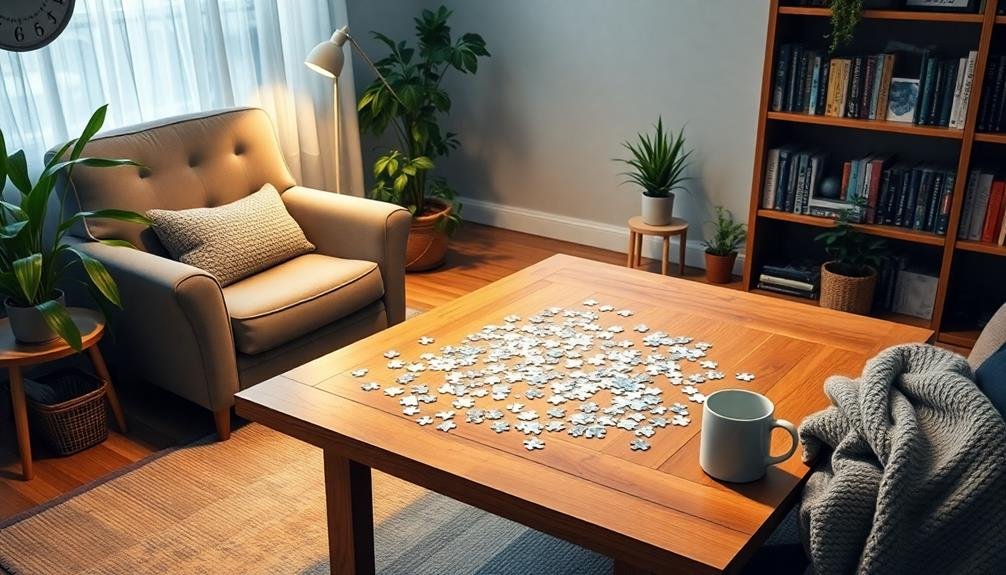
To fully enjoy your puzzle-solving experience, you'll want to create an environment conducive to concentration and relaxation.
Start by designating a specific area in your home as your dedicated puzzle workspace, ensuring it's free from distractions.
Set up proper lighting to reduce eye strain, and choose comfortable seating that supports good posture during extended puzzle sessions.
Dedicated Puzzle Workspace
A dedicated puzzle workspace can greatly enhance your puzzling experience and contribute to anxiety relief. Choose a quiet corner of your home where you can set up a table or desk specifically for puzzling. This area should have good lighting, comfortable seating, and enough space to spread out your puzzle pieces.
Consider using a puzzle mat or board that allows you to easily move your work-in-progress when needed. Organize your puzzle pieces in sorting trays or small containers to keep them tidy and accessible. Keep essential tools like tweezers, magnifying glasses, and puzzle glue nearby.
Personalize your space with calming elements such as plants, soothing colors, or relaxing music to create a tranquil atmosphere.
A dedicated puzzle workspace offers several emotional benefits:
- Excitement: Anticipation builds as you approach your special puzzling area
- Comfort: A familiar, organized space promotes relaxation and focus
- Pride: Your personalized puzzle sanctuary becomes a source of accomplishment
Proper Lighting Setup
Proper lighting is essential for creating a puzzle-friendly environment that reduces eye strain and enhances your overall experience. Choose a light source that provides even illumination across your puzzle area, avoiding harsh shadows or glare. Natural daylight is ideal, so if possible, set up your puzzle space near a window. However, make sure you can control the light with curtains or blinds to prevent direct sunlight from washing out puzzle colors.
For artificial lighting, opt for adjustable desk lamps with cool white LED bulbs. These offer crisp, clear light that closely mimics natural daylight. Position the lamp to shine directly on your puzzle surface without creating reflections. Consider using multiple light sources to eliminate shadows, such as a combination of overhead lighting and task lighting.
Don't forget about ambient lighting in the room. Soft, warm lighting can create a relaxing atmosphere while you work on your puzzle. Use dimmer switches or smart bulbs to adjust the light levels throughout the day.
Comfortable Seating Arrangements
While good lighting sets the stage for your puzzle-solving experience, comfortable seating is key to maintaining focus and reducing physical strain. Choose a chair that supports your back and allows you to sit for extended periods without discomfort. Adjust the height so your feet rest flat on the floor and your arms can comfortably reach the puzzle table.
Consider investing in an ergonomic chair with adjustable features like lumbar support, armrests, and seat depth. These customizable options guarantee you'll maintain proper posture throughout your puzzle sessions.
If you prefer a more relaxed setting, opt for a cozy armchair with supportive cushions and a small side table for your puzzle pieces.
Don't forget to take regular breaks and stretch, even with the most comfortable seating arrangement. Set a timer to remind yourself to stand up and move around every 30 minutes to an hour.
- Feel the tension melt away as you sink into a perfectly supportive chair
- Experience the satisfaction of completing a challenging puzzle without physical discomfort
- Embrace the peace of mind that comes from knowing you're taking care of your body while enjoying your hobby
Frequently Asked Questions
Can Puzzle-Solving Become Addictive or Increase Anxiety?
While puzzle-solving can be enjoyable, it might become addictive for some people. You could find yourself spending excessive time on puzzles, potentially increasing anxiety if you're unable to solve them or feel compelled to complete them constantly.
Are Digital Puzzles as Effective as Physical Ones for Anxiety Relief?
You'll find digital puzzles can be effective for anxiety relief, but physical ones may offer extra benefits. They give you a tactile experience and a screen-free break. Both types can help, so choose what works best for you.
How Long Should I Engage in Puzzles Daily for Optimal Anxiety Reduction?
You'll find ideal anxiety reduction by engaging in puzzles for 15-30 minutes daily. However, don't force it. Listen to your body and mind. If you're enjoying it, feel free to continue longer. Consistency matters more than duration.
Can Puzzle-Solving Replace Professional Treatment for Severe Anxiety Disorders?
No, puzzle-solving can't replace professional treatment for severe anxiety disorders. While it's a helpful coping tool, you'll need clinical interventions for serious conditions. Don't rely solely on puzzles; seek a mental health professional's guidance for proper care.
Are There Any Age Restrictions for Using Puzzles as Anxiety-Relief Tools?
There aren't any age restrictions for using puzzles to relieve anxiety. You can enjoy their calming benefits whether you're a child or a senior. Just choose puzzles that match your skill level and interests for the best experience.
In Summary
You've now discovered a range of puzzle options to help manage your anxiety. Whether you prefer jigsaw puzzles, brain teasers, word games, or number challenges, there's a calming activity waiting for you. Remember, it's not just about solving the puzzle, but enjoying the process. Create a cozy puzzle corner, set aside regular time, and let your worries fade as you focus on the pieces. Embrace these peaceful puzzles as your new anxiety-relieving companions.


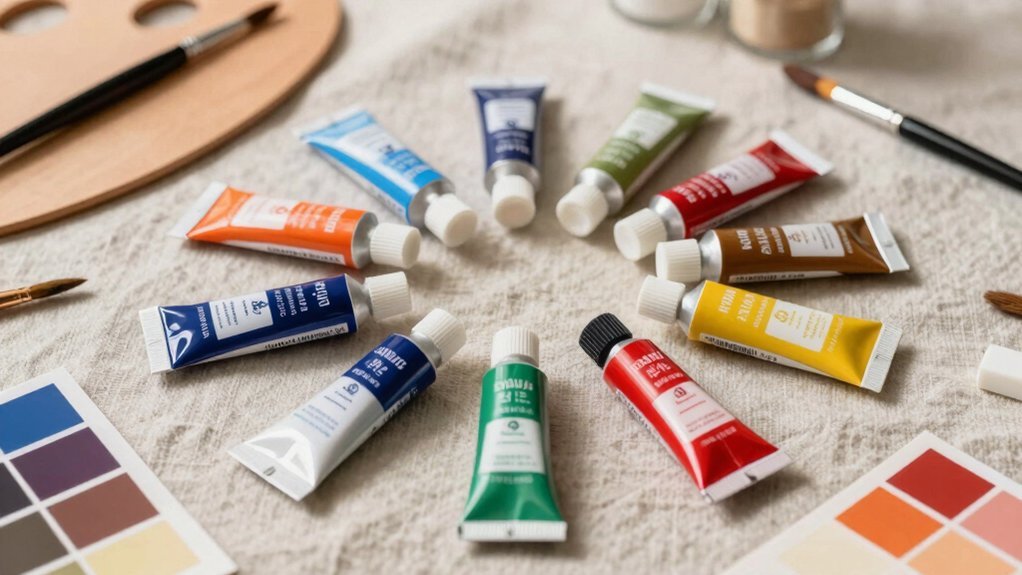
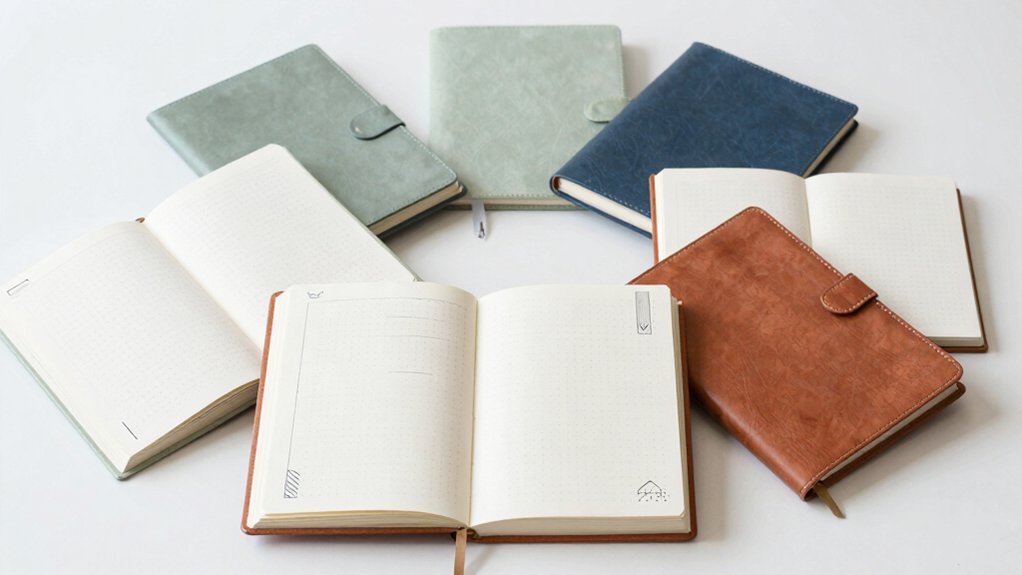
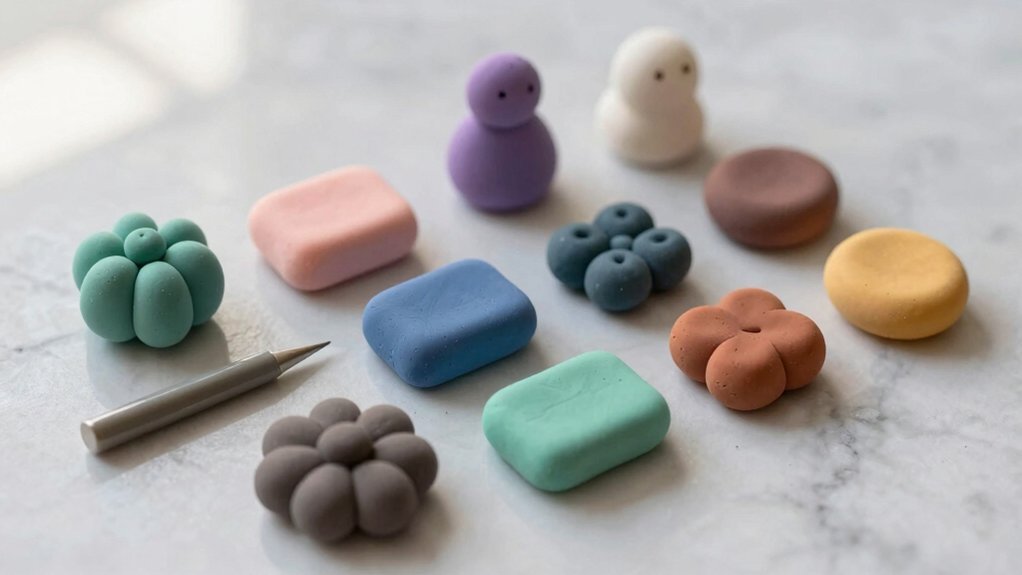
Leave a Reply